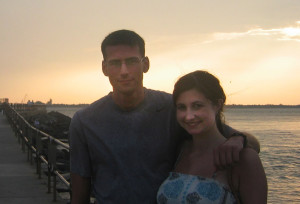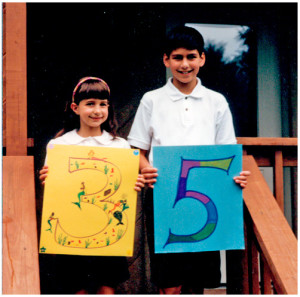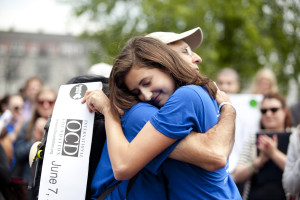 Today’s post is from guest blogger, Carrie Asselin, the sister of Nathaniel Asselin who tragically took his own life at age 24 after battling severe OCD and BDD (body dysmorphic disorder). In this post, Carrie writes about the experience of growing up with an older brother who was her hero and best friend, but who was also tormented by these disorders. Carrie now lives in Boston, MA, where she works in a lab that researches Alzheimer’s at Massachusetts General Hospital.
Today’s post is from guest blogger, Carrie Asselin, the sister of Nathaniel Asselin who tragically took his own life at age 24 after battling severe OCD and BDD (body dysmorphic disorder). In this post, Carrie writes about the experience of growing up with an older brother who was her hero and best friend, but who was also tormented by these disorders. Carrie now lives in Boston, MA, where she works in a lab that researches Alzheimer’s at Massachusetts General Hospital.
My story as the sibling of someone who suffered from Obsessive Compulsive Disorder (OCD) and Body Dysmorphic Disorder (BDD) is a complicated one. My brother, Nathaniel, battled these disorders for 13 years before he made a decision to take his life in April 2011. As his only sibling, I have a unique perspective of what it was like to grow up alongside OCD and BDD.

It began in 1998 when I was nine and Nathaniel was 11, and it happened practically overnight. His OCD took hold with a vengeance, and before we even had a clue what was going on, he was completely at the mercy of his compulsions. Even at such a young age, his biggest concerns were with body image (he was later diagnosed with BDD, a disorder related to OCD), and, for whatever reason, my physique became the standard to which he strived—and with my being over two years younger, he had a dangerous way to go to reach my weight. Along with refusing food, he began to copy my physical exertions, plus a little extra. If I ran across the yard, he would race after me, always a bit faster, a little farther. It was incredibly annoying to my 9-year old self, having my best friend and main companion suddenly turn my every action into a competition, and it was very difficult for me at first to recognize that he was not doing it intentionally.
As his symptoms worsened over the first few months, my confusion was exacerbated by the fact that we struggled to verbally communicate about his illness—he kept his anxiety very hidden from me, deeply ashamed at how bizarre he was acting. I think that, as the older one, and the one who saw himself as my leader and protector, Nathaniel really struggled to admit how much control the disorders had over him.
One day when we were playing together out in our yard, I happened to jump once. He mimicked my movement with a wry smile on his face, which irritated me greatly. I jumped again, and so did he, the smile remaining but his eyes betrayed his mounting inner panic. I realized in that moment how helpless he was, and it suddenly dawned on me the amount of power I held, something I had never possessed as the younger child. It was intoxicating, and all my pent up frustration at Nathaniel for suddenly getting so much attention, ruining our playtime, and essentially ceasing to be the brother I adored so much, now had an outlet. If he took out his anger on me, I would retaliate by provoking his compulsions, despising myself for it but unable to find another release.
My parents did their best to facilitate family discussion about it, but Nathaniel would often shut down. Because of his shame and embarrassment, I also came to believe that OCD was something that should be kept a secret, without even really knowing why. When a classmate of his asked why he had missed so much school, I simply replied that he was sick. “Like pneumonia?” the confused 5th grader asked. “Something like that,” I muttered, somehow scared to admit that it was really OCD.
Fortunately, that initial dark period did not last long—once he was medicated, his symptoms reduced dramatically for several years to come, and our relationship got back on track. He confessed years later how much he hated himself for copying me, but I was still far too ashamed to admit that I had taken advantage of that at times.
Nathaniel’s initial concealment of his illness set the precedent for our discussions (or lack therof) about his struggles for the rest of his life. He was eventually diagnosed with both OCD and BDD, and battled over the years with the recurrence of symptoms and depressive episodes. Despite all that he was going through, he remained a wonderful brother and my soul mate—he was incredibly supportive, and although my petty teenage issues paled in comparison to the severity of his, he always validated my feelings and offered the best advice. Our personalities were intertwined to the point that it was often hard to determine which character traits originally belonged to whom. Like me, Nathaniel was sensitive and highly observant of his surroundings, and we shared an identical sense of humor that was always building upon a massive repertoire of our own recurring jokes.
Over time, Nathaniel’s BDD symptoms put a real damper on his quality of life, but they still were not something that we talked about much. If he had a breakdown, my parents would step in to help while I often retreated from the area if I thought it would help minimize his stress — all the while, that feeling of helpless frustration came creeping back, leaving me to feel as if I was 9-years-old all over again. I found other ways to support him through it all, but watching the BDD take such a toll on him without being able to talk to him about it was unbearable at times. Since his death, I have wrestled strongly with my regret over not pushing him harder to share his struggles with me—but as many siblings of people with a chronic illness know, there comes a point when your brother or sister been ill for so much of your life, that you almost forget to wonder if it has to be that way.
Looking back, Nathaniel’s embarrassment over his own condition paralleled society’s views of psychiatric illness. Things have already come a long way since 1998, but the stigma over mental health issues still persists. And so the question remains: How can we create a society that is comfortable acknowledging and discussing psychiatric illness?
I believe the answer lies in awareness. When Nathaniel was first diagnosed, neither of us had ever heard of OCD or BDD. Had we been already familiar with these disorders, could that have helped him feel less odd? Would he have been more open to discussing it? Those with BDD often experience even more shame and self-disgust than those with OCD, resulting in much higher suicide rates. Can spreading awareness about the prevalence of these illnesses help combat some of that?
I think it absolutely can. It’s hard enough to have to come out as someone who struggles with OCD or BDD, without having to also give a psychology lesson about the disorders at the same time. With increased awareness comes a multitude of positive effects—reduced stigma, faster and more accurate diagnoses, more affected individuals seeking treatment sooner, and an increase in research activity to develop more effective treatments.

Last year, heartbroken over my brother’s death, my father started a pilgrimage to raise awareness about OCD and BDD, and to memorialize Nathaniel. He began walking from our home in Cheyney, PA, and eventually reached Boston, 6 weeks and over 500 miles later. The International OCD Foundation welcomed my Dad to Boston with a rally on June 7th, 2012, where my mom and I held the finish line tape for him to cross, signifying the end of his journey. But, it was not the end. My dad calculated that he walked over 1 million steps on his journey — 1 million steps towards OCD and BDD awareness, 1 million steps towards a better understanding of mental illness, and an end to such prevailing stigma — but he also remarked that we have many, many more to go before we get there.
To that end, this year the International OCD Foundation (IOCDF) is asking all of us to help walk another 1 Million+ Steps 4 OCD Awareness. For those in the Boston area, we will be walking together on June 8, 2013 at Jamaica Pond (click here for details). For those not located in Boston, we are asking you to walk with us “virtually,” by pledging to walk any amount of steps of steps towards the cause, and helping us raise awareness about OCD, and raising money for the IOCDF to help support their mission to help all individuals affected by OCD and related disorders to live full and productive lives (click here to learn about the virtual walk).
Please bring your families, friends, and coworkers, as we together walk 1 million steps (or more) towards finding relief for all of those individuals struggling with OCD and related disorders, and their families, many of whom have been suffering along with them.
To join, go to iocdf.org/1million4ocdwalk and click “I’m In” and register to either walk with me in Boston or register as a “virtual walker” to walk in your community. Then, help us spread the word about this walk, about this cause, and about why you want to help.
I will be walking in memory of Nathaniel on June 8th, 2013. I hope you will join me.

Reblogged this on (A Day in the Life) Un Giorno Nella Vita.
What an inspiration this family is for all of us. Thank you for sharing your story.
Thanks Carrie for sharing your story. I have been in correspondence with your dad. My son has Lcd and bed. That spellcheck will not let me do o
best of luck in Boston for the walk keep hope alive! I will try to do the virtual walk!
Congratulations to all of you who have raised awareness about OCD and BDD. I am the parent of a son with severe OCD and have struggled for years to help him have a healthy, happy and productive life. I am empowered by your story. Thank you for sharing.
Thank you for sharing your story, Carrie. I had the privilege of meeting you dad at last year’s IOCDF Conference. Your family has taken a tragedy and turned it into hope for others. I hope to walk in June……
Thank you Carrie for sharing your story. We live in Australia and our Son has a very debilitating form of OCD which has left him with a vey poor quality of life. As a mum I understand your heartache, frustration and love that you have been through. You and your family are an inspiration in bringing about an awareness of this mental disorder and our thoughts are with you.
Thanks so much for writing with such clarity and compassion, my heart aches for you. But I also sense that through your work and writing others will suffer less than you have — and that is a real gift. With love, Cindy
Carrie, your words are so important and thank you so much for describing your feelings and experiences as Nathaniel’s sister. I feel so empowered and hopeful that your story will bring awareness and hope for other’s struggling with OCD and BDD. My son is currently receiving residential treatment for his OCD, BDD and now eating disorder and I know the struggles your family experienced. As your father was walking last year, my son was at Mclean Hospital and I found so much strength from your families response of action during a sorrowful time. Truly an inspiration. Thank you and we will WALK!!
Carrie, thank you for your your inspiring words–the responses already prove the power of your message. We will be virtual walkers in June! With love, Uncle Bob
Thank you Carrie my son Cody has OCD ,but thanks to The Peace of Mind Foundation he was able to get help through the OCD Project viewd on VH1. Cody still has his struggles however Im proud to say he is now attending College and is on the deans list. I hope to be a virtual walker in June.
Reblogged this on raynbowphoenix and commented:
<3
[…] ← Previous […]
I have suffered from BDD for over 30 years. Thank you for raising awareness.
I have suffered from BDD for over 30 years. Thank you for raising awareness
Dear Carrie,
What a powerful survivor’s story.
I look forward to seeing you next month to discuss next steps
Margaret
My son was diagnosed with ODC at age 12. It came on fiercely, but responded well to medication and became virtually subclinical for the next decade. However, it returned and is now debilitating. We seek answers and effective treatment to get our son back his life again. I will definitely participate in the virtual walk.
Hi Wendy, Please contact our office if you need help connecting with resources to help your son. You can reach us at 617-973-5801. You may also consider attending our annual conference this summer — we have a new workshop track aimed specifically at helping young adults with OCD — if that is feasible for you and your son. You can learn more here: http://www.ocd2013.org/young-adults/
Hello Carly could you please connect me with a support group here in South Africa? I have tried to find something but have not been successful thank you for your time Pam
Hi Pamela-
Our Global Partner in South Africa is the The South African Depression and Anxiety Group. They would be the best organization to contact about finding a support group in your area. They also run an online support group at: http://www.ownocd.ning.com
You can contact them at:
South African Depression and Anxiety Group
P O Box 650301
Benmore
2010
South Africa
Phone: 011-262-6396
Email: Zane1@hargray.com or shai.friedland@gmail.com
Website: http://www.sadag.org and http://www.ownocd.ning.com
Hi, my name is Claire and i am 26 years old. I have dealt with severe OCD (at times mostly not dealt with) since I was 15 years old. Reading your article helped me to feel a little less ashamed about what is wrong with me and helped remind me that it’s not my fault that I am this way, and not alone either. Thanks
I have OCD, pure-O type, its sometimes called, have had it since I was about 20 and I’m now 44, I just started a team and will walk a mile in Roxboro, NC on June 1st, hopefully the walk will be an annual event
My son is 20 years old and he has been diagnosed with OCD recently. I live in India and want to know whether counselling can bring him back to normal life or medication will cure this disorder?
Hello Mahinder: About 7 out of 10 people with OCD will benefit from either Cognitive Behavior Therapy (CBT) or medication. For the people who benefit from CBT, they usually see their OCD symptoms reduced by 60-80%. You can read more about the types of treatment available here: http://ocfoundation.org/CBT.aspx
[…] last two months leading up to tomorrow’s walk have been truly inspirational. When we first announced the 1 Million+ Steps 4 OCD Awareness Walk in May, we weren’t sure exactly what to expect. The […]